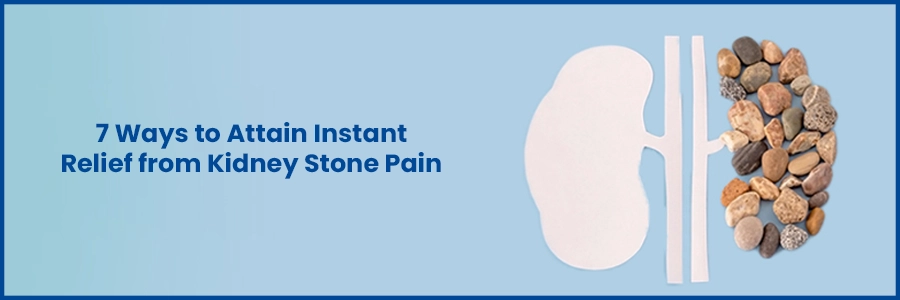7 Ways to Attain Instant Relief from Kidney Stone Pain

The presence of kidney stones has the potential to induce severe pain that is both incapacitating and distressing. These small, hard mineral deposits that form in the kidneys can lead to excruciating discomfort as they move through the urinary tract. If you're grappling with kidney stone pain, it's crucial to know that there are methods to achieve instant relief. In this article, we'll delve into various strategies and techniques that can help you find quick respite from kidney stone pain.
Top 7 Tips For Kidney Stones Pain Relief
Kidney stones, recognized as renal calculi, are solid aggregations of minerals and salts that form inside the kidneys. As these deposits traverse through the urinary tract, they can cause sharp and throbbing pain. The pain is often described as waves of agony that come and go, making it an unbearable experience for many.
The following are some of the most effective methods that you can try to ease the discomfort caused by kidney stone pain. However, if you find that the pain is still bothering you despite trying out these suggestions, it's wise to consider reaching out to a nephrologist, which is a Doctor who specializes in kidney-related issues. Look for one who practices in your local area, as this will make it easier for you to access their care.
When you're dealing with kidney stone pain, it's essential to remember that not all pain relief strategies work the same for everyone. Kidney stones and the pain they cause can vary from person to person, so it's okay to seek help when you need it. Consulting a doctor from a Top rated nephrology hospital can provide you with personalized advice and solutions that are tailored to your specific situation. Here are the 7 most effective tips to get instant pain relief from kidney stones.
Hydration: The First Line of Defense
Staying hydrated is a fundamental aspect of managing kidney stone pain. Drinking an ample amount of water helps flush out the stones and prevents the urinary tract from becoming dry and irritated. This natural lubrication can ease the movement of kidney stones, providing relief from the associated pain. Citrus fruits and herbal teas are also beneficial, as they can promote the dissolution of stones and alleviate discomfort.
Medications for Swift Pain Relief
For instant relief from kidney stone pain, medications can play a crucial role. Over-the-counter non-steroidal anti-inflammatory drugs (NSAIDs) like ibuprofen can help reduce inflammation and alleviate pain. However, it is crucial to seek advice from a healthcare professional prior to self-administering medication. They are equipped to offer suitable advice concerning the correct dosage and possible interactions with any other medications you are presently utilizing.
The Heat Approach
Applying heat to the area of pain can bring immediate comfort. Heat therapy helps relax muscles and soothe tension, indirectly easing kidney stone pain. You can use warm compresses or take warm baths to harness the benefits of heat therapy. Heat also encourages better blood circulation to the kidneys and urinary tract, aiding in pain relief.
Mindful Dietary Choices
Your diet can play a significant role in managing kidney stone pain. Certain foods high in oxalates and calcium can contribute to stone formation. Opting for a diet rich in water-rich fruits and vegetables can keep you hydrated and potentially prevent further stone growth. Reducing sodium intake is also advised, as it can lead to calcium build-up in the kidneys. By making mindful dietary choices, you can alleviate existing pain and take steps to prevent future episodes.
Instant Relief through Natural Remedies
Several natural remedies are known for their potential to provide rapid relief from kidney stone pain. Lemon juice, for instance, contains citric acid, which can help dissolve certain types of kidney stones and reduce pain. Additionally, consuming apple cider vinegar mixed with water can aid in alkalizing the body and potentially breaking down stones. While these remedies might not work for everyone, they offer a natural approach to instant relief.
Seeking Medical Intervention
In cases of severe and unmanageable pain, seeking medical attention is crucial. Medical procedures can provide immediate relief and address the underlying issue. One such procedure is Extracorporeal Shock Wave Lithotripsy (ESWL), which uses shock waves to break down larger stones into smaller fragments that are easier to pass. Another option is ureteroscopy, a minimally invasive procedure where a thin tube with a camera is inserted into the urinary tract to locate and remove stones. These procedures can offer quick relief from intense kidney stone pain.
Mind-Body Techniques for Pain Management
Mind-body techniques, such as deep breathing exercises and meditation, can be effective in managing kidney stone pain instantly. These techniques help relax the body and mind, reducing stress and tension that can exacerbate pain. By incorporating mindfulness into your pain management strategy, you can experience quick relief and a heightened sense of control over your discomfort.